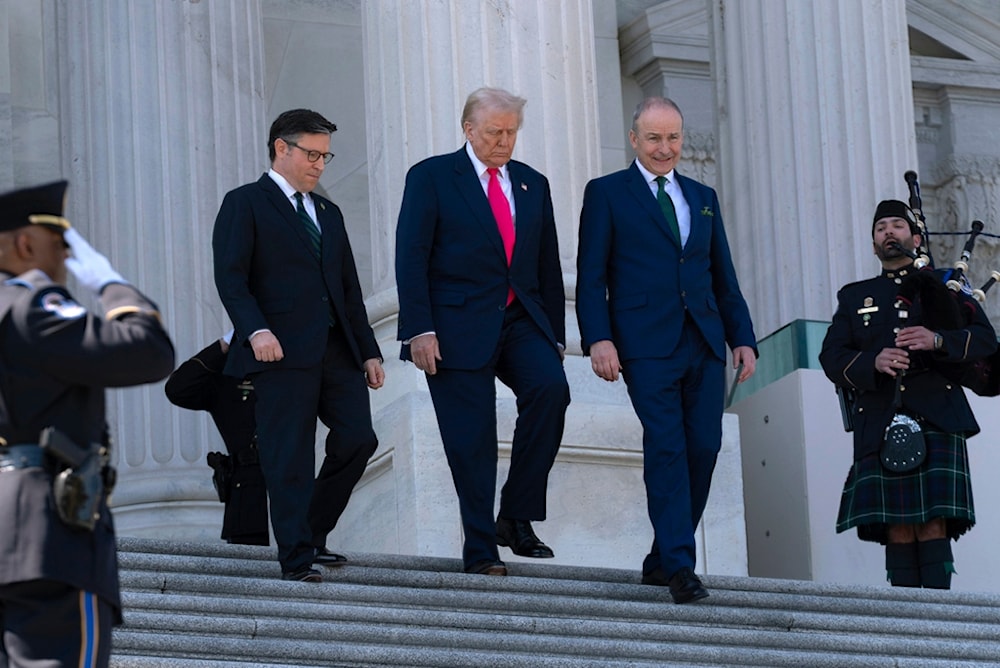Trump backtracks on Gaza proposal, says no one will be expelled
US President Donald Trump reverses course on his proposal regarding ethnically cleansing Gaza after much backlash from around the world.
-

President Donald Trump, center, accompanied by Speaker of the House Mike Johnson, R-La., left, and Ireland's Prime Minister Micheal Martin, walks down the stairs of the US Capitol, after a luncheon on Wednesday, March 12, 2025, in Washington. (AP)
US President Donald Trump stated on Wednesday that "no one will be expelled from Gaza," emphasizing that "no one is forcing the residents of the Strip to leave," in a serious reversal on his staunch support for ethnically cleansing the Palestinian territory.
Trump added that serious efforts are underway in cooperation with the Israeli occupation to resolve the crisis in Gaza.
This statement marks a clear retreat from his earlier proposal to expel Palestinians from Gaza and turn the territory into what he described as the "Riviera of the Middle East," a suggestion that faced widespread rejection both regionally and internationally.
Trump made these remarks during a meeting with Irish Prime Minister Micheal Martin in Washington, where they discussed the situation in Gaza.
Following the meeting, Martin stated, "We want the release of prisoners and peace in Gaza," stressing the need to establish a ceasefire amid international mediation efforts to advance the second phase of the truce agreement between Hamas and the Israeli regime.
Trump threatens Gazans with 'death'
Trump told the Palestinian Resistance Movement Hamas on Thursday that he would authorize fresh Israeli strikes on Gaza unless the group frees the remaining Israeli captives.
Trump's ultimatum came during direct discussions in Doha between his envoy for captive matters, Adam Boehler, and Hamas leaders in an attempt to achieve a fresh Gaza ceasefire and prisoner exchange agreement.
Trump gave the ultimatum after meeting with six captives freed as part of the first phase of the ceasefire agreement.
A senior Hamas official told Al Mayadeen that the recent meeting left the American side with a "positive impression" regarding the possibility of negotiations with the group.
However, the official noted that the US envoy focused solely on a potential prisoner exchange and did not address broader issues, such as a ceasefire or an end to the war on Gaza.
Trump expects Russia to agree to Ukraine ceasefire
In a separate context, President Trump announced that he expected Russia to agree to a proposal for an immediate ceasefire in Ukraine, expressing hope that this can be achieved without the need for external pressure.
When asked whether Washington had leverage over Moscow in reaching a settlement, Trump said, "I hope it won't be necessary. We can do this with Russia," adding that financial sanctions "could be devastating" for Moscow.
He explained that the United States has financial means to pressure Russia but noted that using them could conflict with the goal of achieving peace in Ukraine.
Trump expressed optimism about a positive response from Moscow, stating, "There are US officials heading to Russia at this moment, and we hope to secure Russia’s approval for a ceasefire."
Earlier, Trump had announced plans to speak with his Russian counterpart in the coming days, following Kiev's approval of a US-backed proposal for a 30-day ceasefire in Ukraine.
US to 'win' in trade war with EU
Meanwhile, Trump asserted his confidence that the United States "will win" the ongoing trade war with the European Union, as both sides continue to impose additional tariffs on each other.
"We will win this trade battle," Trump declared.
When asked about his response to the EU's tariffs, he said, "Of course, I will respond," adding that "Ireland is among the countries taking advantage of the United States."
The United States expanded its range of tariffs on Wednesday as broad duties on steel and aluminum imports came into force "with no exceptions or exemptions," as pledged by the White House—despite multiple countries’ efforts to avoid them.
Trump’s decision to impose 25% tariffs on both metals is expected to increase production costs for various goods, including home appliances, automobiles, and beverage cans, potentially driving up consumer prices.
Since returning to office, Trump has imposed significant tariffs on key US trading partners, including Canada, Mexico, and China. While he permitted a partial rollback for Canada and Mexico, he has also vowed to introduce additional duties beginning April 2.

 4 Min Read
4 Min Read










